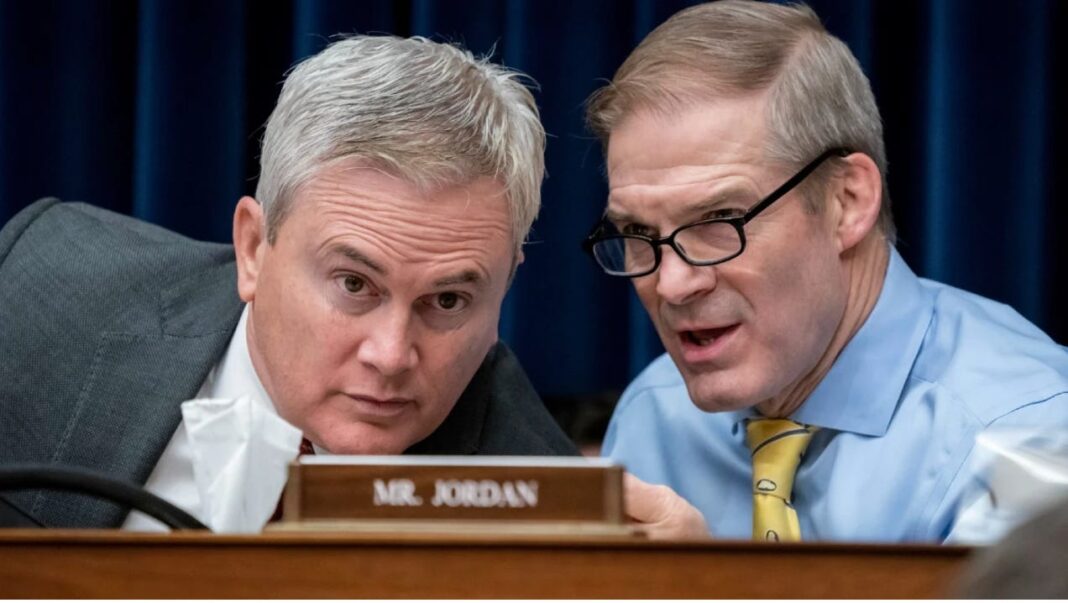Last week, the House Committee on Oversight held its first hearing on Twitter’s deliberate campaign to censor conservatives, ban journalism, and directly interfere in the 2020 election. The centerpiece of Kentucky Republican Chairman James Comer’s investigation focused on Twitter’s decision to suppress the New York Post’s exposé on Hunter Biden and his laptop.
What the public has learned should remain stunning. Even prior to the release of the “Twitter Files,” many were aware that Twitter had likely swung the election (we reported as much in American Principles Project’s Big Tech vs. Democracy report). But before the Twitter Files and these hearings, most had no idea that agents of the federal government were so intimately involved in Big Tech censorship.
As you’ll recall, the Post articles, which were sourced directly by emails contained on Hunter Biden’s laptop, exposed a plan to set up meetings between Burisma—a Ukrainian energy company that had been paying Hunter Biden enormous sums of money despite his inexperience in the energy sector—and his then-vice president father. Joe Biden publicly disavowed any knowledge of his son’s business dealings. But with a few weeks to go until the election, this story was going to be an enormous political liability for the Democrats—and the voters were going to have a big decision to make.
Unless, of course, the voters never saw the story. Within hours of the articles’ release that morning, both Facebook and Twitter banned the New York Post story from their platforms. Twitter even locked out the New York Post’s account. But why?
Rep. Comer (left), Chair of the House Oversight Committee, and Rep. Jordan (right), Chair of both the House Judiciary Committee and the Select Subcommittee on the Weaponization of the Federal Government, were made for this moment.
Testimony at Wednesday’s hearing provided a smoking gun. This appears to be even more of a scandal than previously imagined, one that implicates state actors in illegally violating the First Amendment to censor speech and influence an election.
As the former head of Trust and Safety at Twitter, Yoel Roth was responsible for decisions about content on that platform, including “election security.” He also starred prominently in the “Twitter Files.” This made Roth of particular interest to the House Oversight Committee.
Roth bears all the indicia of an ardent Trump-hater. During questioning by Rep. Comer, Roth admitted to have used his personal Twitter account to tweet against what he called the “actual Nazis in the [Trump] White House.” And yet, according to his testimony, a ban on the New York Post story was so unsupported by Twitter policies that even he could find no justification for it as he reviewed the issue around 9 a.m. on the morning of the articles’ release.
But in the next hour and a half, something changed. Enter James Baker, another Trump detractor and former FBI general counsel who had left that position in the wake of being investigated for alleged leaks to the media and who had been a central figure in the now fully debunked Trump-Russia collusion hoax. From the Bureau, he was lateralled into Twitter as its assistant general counsel, shortly before the 2020 election.
As the questioning of Roth by Arizona Republican Representative Andy Biggs revealed, by 9:26 a.m. that morning, despite Roth’s opposition, Baker began to spin a theory of a “hack-and-leak”—i.e., that somehow the Hunter Biden emails were the result of a cyber hack that were then improperly leaked to the press. As we know now, that wasn’t true. The laptop was Hunter Biden’s, the emails were authentic, and Hunter forfeited possession of his computer when he abandoned it at a repair shop.
In order to find a Twitter policy justification to deep-six the Post series under the “hack-and-leak theory,” evidence would be needed. A “powerful” kind of evidence, Roth testified, would be a finding by a government agency. Was there? No, Roth stated definitely, “we did not have any specific information from any government source.” And here is where the whole “hack-and-leak” pretext falls apart. In responding to Rep. Biggs, Roth said the only basis he knew was that certain so-called cyber-security experts had been “tweeting” the theory.
In other words, Twitter was preparing to ban a national newspaper’s election-related reporting merely on the basis of unsubstantiated tweets from a bunch of left-wing resistance grifters.
Regardless of the paucity of any real evidence, by 10:12 a.m. there was a consensus created within Twitter that the ban had now found a handy rationale, with Baker, ostensibly representing the FBI and the intelligence community, apparently at the center of it. Compare that to Baker’s prepared written statement to the committee. Baker writes that in that morning’s lead-up to the New York Post ban, he “noted that we needed more information to fully assess what was going on and to decide what to do.”
Now contrast that to Baker’s answer to Rep. Comer’s question regarding whether he reached out to the FBI for information. Baker said he made no effort to use his contacts with any of the Bureau’s cyber experts to substantiate his “hack-and-leak” abstraction, even though he was its former general counsel. And in a back and forth with Ohio Republican Representative Jim Jordan, Baker struggled to answer basic questions about when he had spoken to the FBI about the story.
If Baker’s written statement was true, Baker had violated his own standard, perhaps maliciously. He rushed Twitter into an unsubstantiated ban executed in just two hours while failing to seek the “more information” he admits he needed. If that statement was untrue, then he just lied to Congress. As Rep. Comer explained in his opening statement, “Twitter, under the leadership of our witnesses today, was a private company the federal government used to accomplish what it constitutionally cannot: limit the free exercise of speech.” It’s clear after Wednesday’s testimony that this was indeed the case. And the stakes couldn’t have been higher.
Twitter’s decision to ban the New York Post story, roundly condemned even by its former CEO, very likely changed the outcome of a close presidential election. Biden’s combined margin of victory in three crucial swing states was so narrow it wouldn’t have filled a football stadium. And a poll by the Media Research Center shows that almost 50 percent of voters knew nothing about the Biden laptop scandal, and nearly 10 percent said they would not have voted for Biden had they known.
We know what happened in 2020. Now we need to make sure this never happens again. Comer and Jordan, along with Washington Republican Representative Cathy McMorris-Rodgers have introduced the Protecting Speech from Government Interference Act, which if passed would hopefully prevent future government collusion with Big Tech. That bill is a good start.
But we know the power these Big Tech companies have to put their thumb on the scale of democracy. We know we won’t always be able to implicate government bureaucrats in censorship decisions. That is why the American people ultimately need Section 230 reform that imposes a First Amendment content moderation standard on the largest, market-dominant platforms. Free speech has to be the rule, not the exception. Because without free speech online, free and fair elections will become a relic of a bygone era.
















